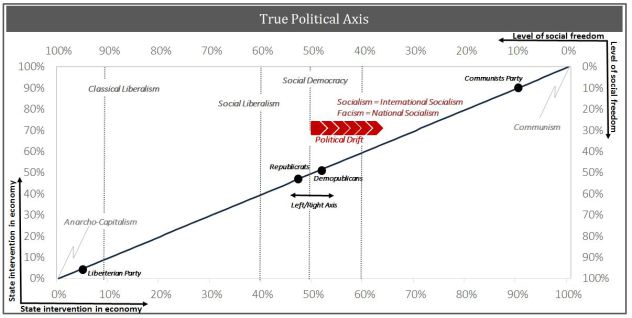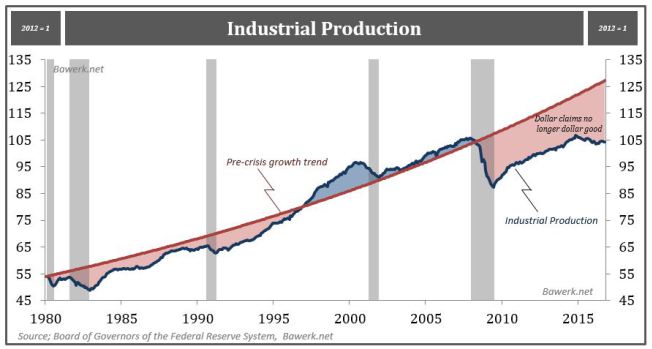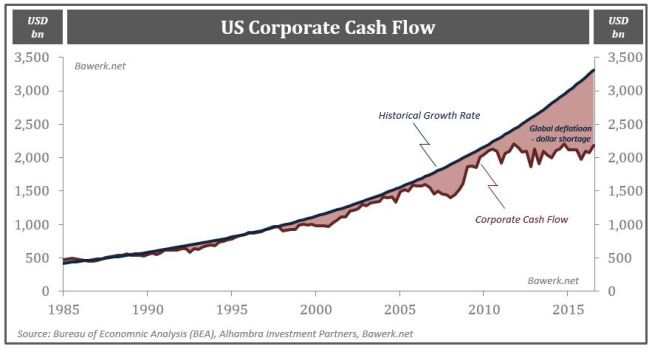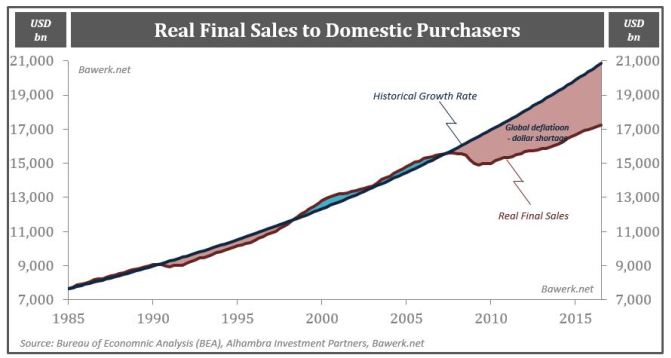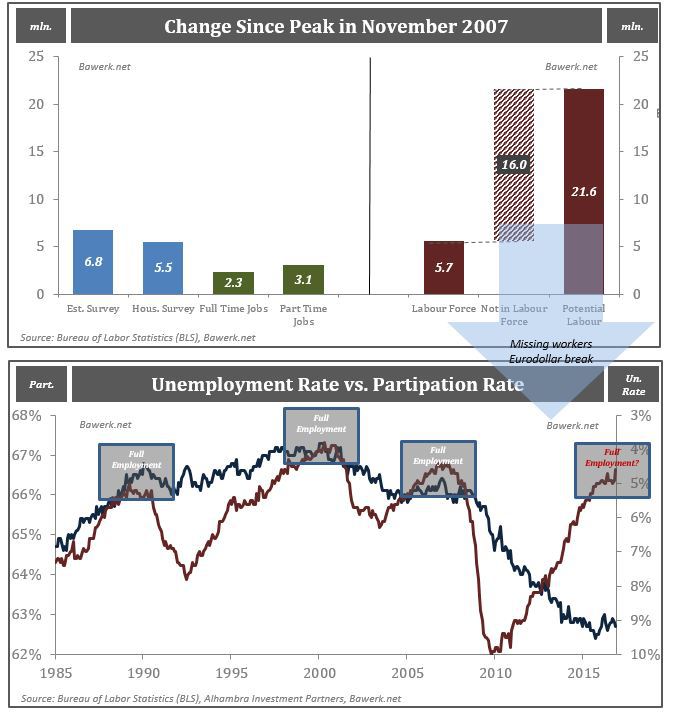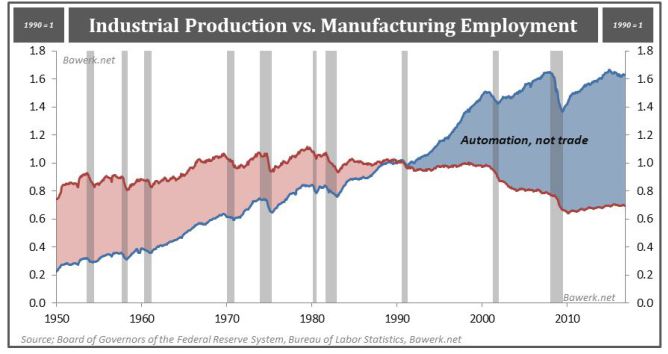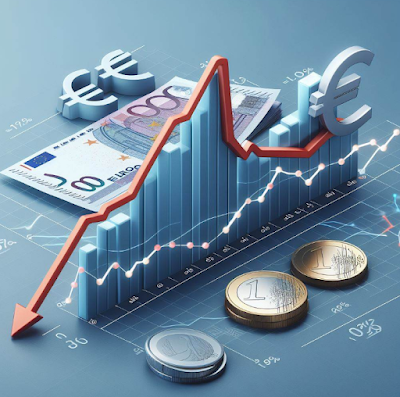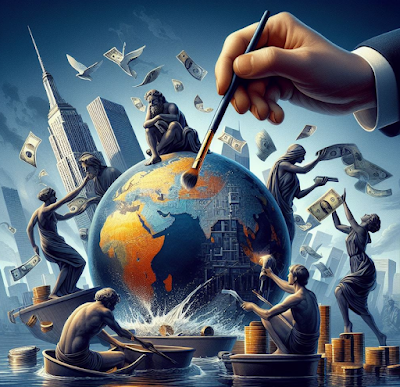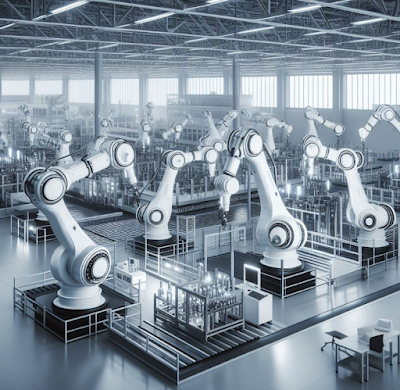A new world order is coming of age and the transition is painful to accept for a Western middle class with a deep-seated sense of entitlement. We showed how the West feels threatened globally in Toward a New World Order and followed up explaining how this translate into domestic politics in Toward a New World Order Part II. We will now continue this series by showing how gross economic mismanagement have created the new political class that we described in part two. As we stated back then, a large and increasing part of the electorate, swayed by neither the political correct socialist/feminist/cultural relativist dogma presented by the left, nor the lip service paid to free markets by a corrupted right, have taken hold in western democracies. They form a directionless blob of potential voters which until recently have drifted aimlessly along the political spectrum. Now they have made up their mind and it is proving pundits clueless as to what is going on. The “worker” making millions on Wall Street or by helping Google refine their search engine is not the same “worker” we find in flyover America. The young billionaire making apps to entertain confused millennials and snowflakes is not the same capitalist as the shale oil investor we might encounter in North Dakota. Political classes traditionally defined are useless as a tool to understand the world today. What is important to note though is that a growing minority of people with little to lose from the status quo is about to, or in many places have already become a small majority.
| When people have nothing to lose and foresee a future of continued hardship they become desperate and are willing to change for the sake of change itself. When the current leadership provide nothing but more of the same hopelessness, they will move politically toward to candidates with views counter to that held by the establishment. Before we move on, let us examine the upcoming election in France to show what we mean. In the traditional way of viewing national politics in France, it will be impossible for Le Pen and her Front National to win. Why? Because the left will hold their nose and vote for right-wing Republican Fillon in the second round to strategically avoid Le Pen. While some undoubtedly will follow the traditional recipe of left-right politics, it is far from certain that enough will do so to avoid a Le Pen victory. On the contrary, as we showed in part II, this line of thinking is outdated and a better representation is shown in the chart below. |
True Political Axis |
Len Pen and FranceUsing our methodology, we come up with a far more likely scenario on how the French voters will vote come May. With the center right representing everything the middle class loath, they will not migrate from the center-left to help Fillon to victory. Le Pen’s vote base is not disillusioned UMP voters, but blue-collar workers that used to support the socialists and militant French unions. We do not draw this conclusion from some unique insight into French politics, but from observing a tendency across the whole of western society as a larger and larger share of the population have lost hope for the future. One of the most primal driving forces in humans is the belief in a brighter future. Dirt poor in Africa or pampered by the European welfare state, it does not matter. What matters for the positive development of the human spirit is an expectation that next year will be better than the current one. If that belief is taken from them, they will most certainly force real change on the system as they feel there is little to lose. So what went wrong? There are many answers to this question and we have tried to address several on them on these pages earlier, such as excessive debt levels, monetary policy gone awry and demographics. We would also add to the list that we have seen a general tendency toward destructive policies as a result from people losing purpose in life; in this regard, it is no coincidence that environmentalism appeared as a new form of religion on the “godless” continent. In That 70s Show (part I, II, III and IV) we spelled out how things changed after Nixon took the US dollar off gold and gave the Americans the ability to exchange nothing for something. Obviously, this created an irresistible incentive to consume more than the Americans could produce, which in turn artificially changed relative prices. A new productive structure emerged because of the new set of prices, but unless the dollar issuance continued, and even accelerated, it would not be possible to sustain the ensuing capital allocation. |
How Len Pen will win and next French President |
| In other words, this road have taken us all down a very unpleasant path as every time the central bank, and/or the commercial banking system (including global dollar claims dubbed Eurodollars) is forced to retrench a recession must necessarily set in as the nothing-for-something-transaction have to be undone. However, as long as the global community accept dollar claims as money good the banking system can always gear up in time of crisis to avert the worst of inbuilt consequences stemming from past folly.
What made 2008/09 so special is the fact that the global dollar community had in fact reached peak debt. In other words, further dollar claims were no longer considered money good and the global banking system could no longer reflate the balance sheet, as this would have been unacceptable to their counterparties. A different way of looking at this is through the capital structure. At peak debt the current structure can no longer be funded as the pool of real savings is gradually depleted by the incessant something-for-nothing-transactions. We, as participants in a global economy, have essentially been consuming our seed corn. Private Sector EmploymentIn the 1970s the US economy employed about 50 per cent of its workforce in private sector service occupations. However, as the nothing-for-something system got under way the share of service sector employment rose almost constantly to reach more than 70 per cent today. This transformation can be characterized as a move away from tradable sector toward non-tradable, and was inevitable since the US manufacturing sector essentially had to compete against foreign products that cost the American system nothing to procure.
|
Service Sector Employment |
| Service sector jobs have, or at least used to have, less scope for productivity improvements and hence real wage increases. Furthermore, goods producing sectors were clearly affected as they could no longer compete successfully against foreign producers. As a consequence, investments fell, thus dragging down productivity even more. Wages in tradable sectors naturally stagnated as a result. Amazingly, the real wage level in the 1970s for middle class workers is the same as today (using the BLS headline CPI index as deflator). Service sector wages must follow that of the goods producing sector and stagnated too.
|
Industrial Production(see more posts on U.S. Industrial Production, ) |
US Corporate Cash Flow |
|
Real Final Sales to Domestic Purchasers |
|
Change Since Peak, Unemployment Rate vs. Participation Rate(see more posts on U.S. Participation Rate, U.S. Unemployment Rate, ) |
|
U.S. Total Retail Sales(see more posts on U.S. Retail Sales, ) |
|
| We could go on, but you get the picture. The recession of 2008 triggered a structural change in the global economy, and we are confident that the mechanism behind it is the breakdown of the Eurodollar system that came about at peak debt.
Before we end, we would like to highlight one more thing. As the American worker had to compete with zero cost foreign competitors, manufacturing businesses in the US were forced to either move abroad, shut down or invest in automation. This pressured workers even more and help explain why industrial output continued to rise even though the number of employees in the sector fell in successive waves. It is also noteworthy that this positive trend ended with the collapse of the Eurodollar. Bottom line, the new world order that made itself felt in 2016 will be even more pronounced in 2017 with elections in the Netherlands (Geert Wilders could end up kingmaker or even prime minister), France (we predict a Le Pen victory) and Germany (where AfD will surprise everyone). |
Industrial Produstion vs. Manufacturing Employment |
Next time we will look at the investment implications from all this.
Tags: Austrian economics,Banking,bubble,central-banks,Economics,Europe,Monetary Policy,newslettersent,Politics,Price Inflation,productivity,U.S. Industrial Production,U.S. Participation Rate,U.S. Retail Sales,U.S. Unemployment Rate,US









